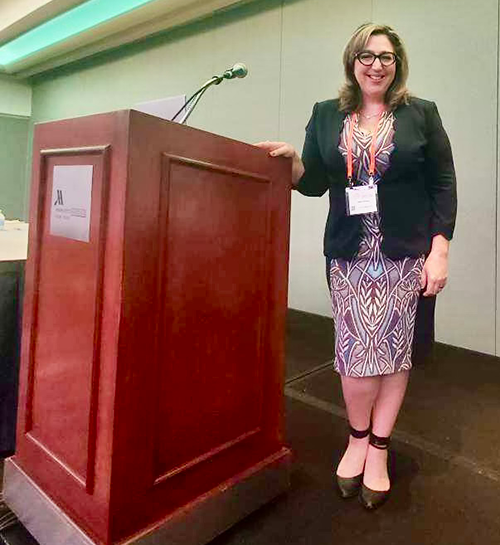H. Allison Bender, PhD, director of neuropsychological services at Weill Cornell Medicine Neurological Surgery, was an invited speaker at two separate symposia at the 52nd annual meeting of the International Neuropsychological Society in New York. The theme of this year’s meeting was Culture and Connectivity: Neuropsychology Without Borders, which aligns with Dr. Bender’s commitment to health care equity.
Dr. Bender presented an abstract, “Addressing Disparities: Neuropsychological Assessment Modifications for Special Populations Requiring Neurosurgical Interventions,” along with Jessica Spat-Lemus, PhD, a former faculty member here and currently director of the Clinical Master’s Program at Montclair State University. The abstract was co-authored by Robert A. Beattey, JD, PhD, ABPP, assistant professor at UC Davis in Sacramento. The presentation provided an in-depth look into the unique considerations required when working with patients who are members of the deaf/hard-of-hearing or blind/low-vision communities, or those who have other motor- or communication-based challenges that could affect their neuropsychological assessment. Considering the potential for error when working with presurgical patients with additional sensory or physical concerns requires extraordinary care and command of the relevant literature.
“One size simply does not fit all,” says Dr. Bender. “Advance preparation to consider the patient’s unique needs, combined with careful test selection and adaptation specific to the individual, will produce more accurate assessments. This is especially important in a population as diverse as New York’s, but it applies everywhere -- every patient is unique and will benefit from testing that accounts for their specific needs.”
Later, in a symposium on Bilingualism and Culture in Epilepsy Across the Lifespan: A Multidimensional Perspective, Dr. Bender presented on Electrical Stimulation Mapping in Historically Underserved Populations With Epilepsy: A Patient-Centric Approach. In that presentation, Dr. Bender spoke about the intricate preparation and degree of patient-provider collaboration required prior to surgery, considering everything from the patient’s emotional state, history of trauma, religious beliefs, and language abilities. Dr. Bender emphasized the importance of defining a patient’s interests and concerns -- for example, if language may be affected, which language would a bilingual patient prioritize? To the patient, what would be viewed as their most desired outcome and was this clearly communicated to their surgical team?
“This patient-focused approach to care is one of the core missions of our department,” says Dr. Philip E. Stieg, chair and neurosurgeon-in-chief. “I deeply appreciate that it is one of Dr. Bender’s top priorities, because it aligns perfectly with our values in honoring differences and treating each patient as a unique individual.”
Dr. Bender is an award-winning, board-certified neuropsychologist with expertise in evaluating patients before and during neurological surgery, and with a special interest in the neuropsychological needs of non-native English speakers. She is active in professional groups working to reduce disparities in healthcare and holds leadership roles in multiple neuropsychological organizations committed to equity for all.


